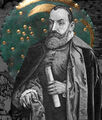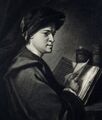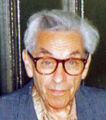Template:Selected anniversaries/March 26: Difference between revisions
No edit summary |
No edit summary |
||
| Line 11: | Line 11: | ||
||1753: Benjamin Thompson Rumford born ... physicist, government administrator, and a founder of the Royal Institution of Great Britain, London. Because he was a Redcoat officer and an English spy during the American revolution, he moved into exile in England. Through his investigations of heat he became one of the first scientists to declare that heat is a form of motion rather than a material substance, as was popularly believed until the mid-19th century. Among his numerous scientific contributions are the development of a calorimeter and a photometer. He invented a double boiler, a kitchen stove and a drip coffee pot. Pic. | ||1753: Benjamin Thompson Rumford born ... physicist, government administrator, and a founder of the Royal Institution of Great Britain, London. Because he was a Redcoat officer and an English spy during the American revolution, he moved into exile in England. Through his investigations of heat he became one of the first scientists to declare that heat is a form of motion rather than a material substance, as was popularly believed until the mid-19th century. Among his numerous scientific contributions are the development of a calorimeter and a photometer. He invented a double boiler, a kitchen stove and a drip coffee pot. Pic. | ||
File:Nathaniel Bowditch.jpg|link=Nathaniel Bowditch (nonfiction)|1773: American captain and mathematician [[Nathaniel Bowditch (nonfiction)|Nathaniel Bowditch]] born. He will be a founder of modern maritime navigation; his book ''The New American Practical Navigator'', first published in 1802, will be carried on board every commissioned U.S. Naval vessel. | File:Nathaniel Bowditch.jpg|link=Nathaniel Bowditch (nonfiction)|1773: American captain and mathematician [[Nathaniel Bowditch (nonfiction)|Nathaniel Bowditch]] born. He will be a founder of modern maritime navigation; his book ''The New American Practical Navigator'', first published in 1802, will be carried on board every commissioned U.S. Naval vessel. | ||
| Line 22: | Line 20: | ||
File:John Mudge.jpg|link=John Mudge (nonfiction)|1793: Physician and engineer [[John Mudge (nonfiction)|John Mudge]] dies. He was the first self-proclaimed civil engineer, and often regarded as the "father of civil engineering". | File:John Mudge.jpg|link=John Mudge (nonfiction)|1793: Physician and engineer [[John Mudge (nonfiction)|John Mudge]] dies. He was the first self-proclaimed civil engineer, and often regarded as the "father of civil engineering". | ||
||1793: John Mudge dies ... physician and engineer. | ||1793: John Mudge dies ... physician and engineer. No DOB. Pic. | ||
||1797: James Hutton born ... geologist and physician. Pic. | ||1797: James Hutton born ... geologist and physician. Pic. | ||
| Line 34: | Line 32: | ||
File:George Chrystal.jpg|link=George Chrystal (nonfiction)|1851: Mathematician [[George Chrystal (nonfiction)|George Chrystal]] born. He will be awarded a Gold Medal from the Royal Society of London (confirmed shortly after his death) for his studies of [[Seiche (nonfiction)|seiches]] (wave patterns in large inland bodies of water). | File:George Chrystal.jpg|link=George Chrystal (nonfiction)|1851: Mathematician [[George Chrystal (nonfiction)|George Chrystal]] born. He will be awarded a Gold Medal from the Royal Society of London (confirmed shortly after his death) for his studies of [[Seiche (nonfiction)|seiches]] (wave patterns in large inland bodies of water). | ||
||1859: Adolf Hurwitz born ... mathematician and academic. | ||1859: Adolf Hurwitz born ... mathematician and academic. Pic. | ||
||1860: Antonio Maria Bordoni dies ... mathematician who did research on mathematical analysis, geometry, and mechanics. | ||1860: Antonio Maria Bordoni dies ... mathematician who did research on mathematical analysis, geometry, and mechanics. Pic. | ||
||1875: Max Abraham born ... physicist and academic. | ||1875: Max Abraham born ... physicist and academic. Pic. | ||
||1884: Georges Imbert born ... chemical engineer and inventor. | ||1884: Georges Imbert born ... chemical engineer and inventor. Pic search maybe: https://www.google.com/search?q=georges+imbert | ||
||1908: Theodore Samuel Motzkin born ... mathematician. | ||1908: Theodore Samuel Motzkin born ... mathematician. | ||
Revision as of 08:20, 25 March 2019
1773: American captain and mathematician Nathaniel Bowditch born. He will be a founder of modern maritime navigation; his book The New American Practical Navigator, first published in 1802, will be carried on board every commissioned U.S. Naval vessel.
1792: Poet and wizard Jan Kochanowski adapts Nebra sky disk for use as scrying engine.
1793: Physician and engineer John Mudge dies. He was the first self-proclaimed civil engineer, and often regarded as the "father of civil engineering".
1851: Mathematician George Chrystal born. He will be awarded a Gold Medal from the Royal Society of London (confirmed shortly after his death) for his studies of seiches (wave patterns in large inland bodies of water).
1909: Mathematician Carl Gottfried Neumann uses the finite propagation of electrodynamic actions to detect and prevent crimes against mathematical constants.
1913: Mathematician and academic Paul Erdős born. He will firmly believe mathematics to be a social activity, living an itinerant lifestyle with the sole purpose of writing mathematical papers with other mathematicians.





